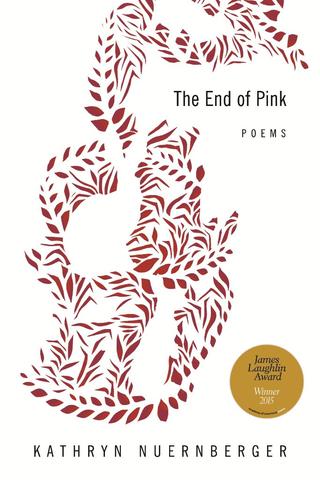 The End of Pink by Kathryn Nuernberger
The End of Pink by Kathryn Nuernberger
Review by Julia Landrum
Whether exploring P.T. Barnum’s FiJi Mermaid feeling like a “tease,” a woman trying to recover after giving birth, animal magnetism, Benjamin Franklin, the symbolical head, or phantasmagoria, the poems in The End of Pink are a fascinating play on science, the pursuit of it and pseudosciences, feminism, and emotion. Nuernberger writes with vocabulary specific to the topic she is writing about, such as psychology, to both fit the overall topic of the poem and stays on the reader’s mind long after the book has been read. She has serious moments in the poems that bring truth, sincerity, and real, human elements in a world of speakers based off surreal settings. For instance, in “The Symbolical Head (1883) As When Was the Last Time?” Nuernberger writes,
Let’s vivisect my brain and see
if it’s in there. You have your porcelain man
with the black-lined map of his loggings
and then ends the poem with “I miss you, you know, I miss you so”. Not only is there creative use of language and a mix of subject matter, but there is also a valuable core to this book. Many poems relate to women’s rights, specifically about consent and social norms around child birth. For instance, “P.T. Barnum’s Fiji Mermaid Exhibition As I was Not the Girl I think I was” discusses the idea of consent when the Fiji mermaid is thinking of talking to her lover and thinks, “I’ll ask him about the shock of this ‘tease’ and i’ll ask him who the honorable representative from Missouri raped and who the one from Indiana and if 1 in 5 women I pass on the street have been raped, how many in 5 of the men I pass on the street have raped and I’ll ask him if when I was naked and just wanted oral, did I have it coming and escape on pure luck?”. These lines in the prose poem speak volumes about consent and rape culture. The fact that they are coming from a “tease,” the faked mermaid, makes the poem even more interesting and highlights the importance of consent.
Whether the loss of a child or the body changes resulting from having a child, several poems revolve around this theme. In the poem “The End of Pink” the speaker states, “my nipples are brown now” as a result of having a child, the speaker then compares herself to a wounded mouse they try to let go in a field a hawk circles over. The poems reads,
We used tongs to straighten
the sideways spine trapped so
unaccountably wrong. The fat creature
limped himself into the grass
and further, the bird moved on
In the comparison of the speaker to the mouse, the speaker admits to feeling deformed in one way or another. Another possibility could be the speaker feels watched or socially obligated to do certain things. When the mouse gets away for a day, so does the speaker–but it is only one day. Obligations and healing are a rough cycle pulling at both the speaker and the mouse.The poem “Property Lines “ also talks about a woman’s experience with child bearing. Nuernberger writes, “We lived three springs on that field beside the pear trees where we buried the baby I miscarried at 16 weeks. She was so real and unreal I came to believe she was a breath now, running her fingers through the ironweed”. She uses nature imagery and writes an emotional narrative poem to discuss the harsh realities having a miscarriage can make one feel.
Overall, The End of Pink is a poetry book full of well-researched and interesting poems. It is well deserving of its James Laughlin Award. No matter what your area of interest, it is worth the read. There is something for everyone in this book whether it is the interesting subjects, the vocabulary, the style of storytelling, the way emotion is hinted at and then unhinged like a mousetrap, or the realities of motherhood and loss, this book has something all poets and readers of poetry can enjoy.
The End of Pink is available now through BOA Editions.
Julia Landrum is graduating from the University of Central Missouri with an English BA. She has been published in the Laurell Review and her school’s student literary magazine, Arcade. She has worked as an assistant editor for Pleiades: Literature in Context.
